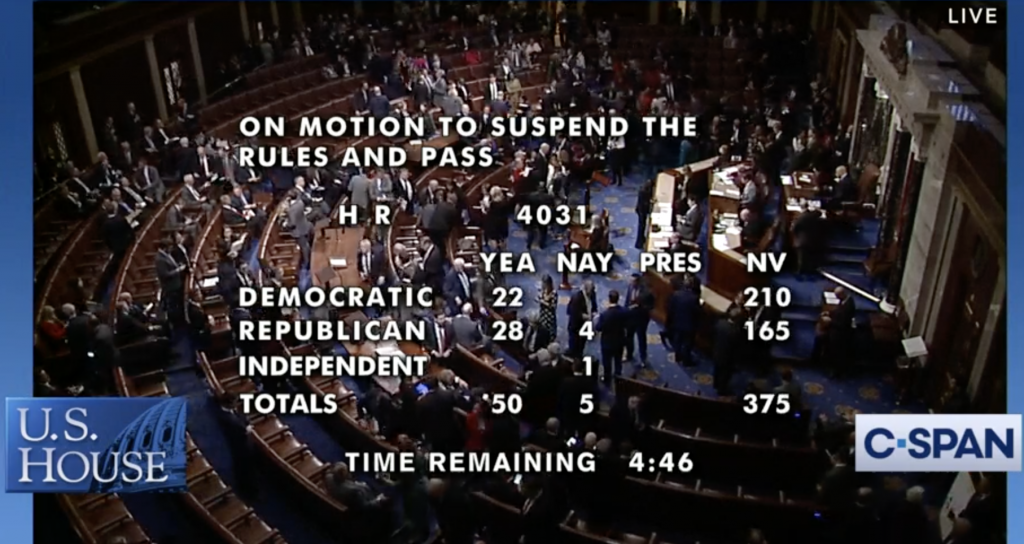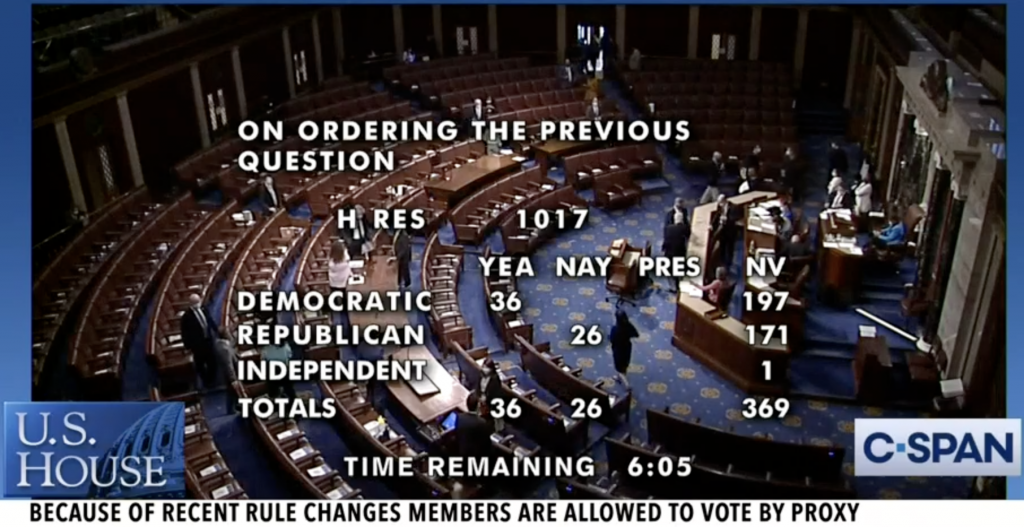Meeting with constituents, speaking with staff about legislation, scurrying from one committee hearing to another: These are all activities that Members of Congress engaged in in-person prior to the COVID-19 pandemic. As society reopens, Members of Congress ought to return to their normal, pre-pandemic activities, just like everyone else. The most important in-person activity Members must return to is voting in person on the Floor of the House.
Since May 2020, the House has allowed proxy voting, a practice where one Member authorizes a colleague to vote on their behalf and instructs the colleague which way to vote. Prior to May 2020, the House never authorized proxy voting on the Floor–an action that is of dubious constitutionality to start with. The resolution that provided for proxy voting authorized the Speaker to allow the practice for a specified period when the Sergeant-at-Arms declared that the country faced a public health emergency due to the coronavirus pandemic. About a year later, we won’t see an end to proxy voting anytime soon, since Speaker Nancy Pelosi recently prolonged the period in which the House may vote by proxy until July 3. In response, the House Republican leadership and committee ranking Members sent a letter to the Speaker asking her to end proxy voting. That is something all Members ought to agree with.
The House should end proxy voting immediately since legislatures are peculiarly relationship-driven organizations. The very word “congress” means “the act or action of coming together.” It thrives when Members and staff have strong bonds with each other. Conversely, when Members are unable or unwilling to work with each other, whether it is within a party or across the aisle, legislative muscles atrophy and the institution suffers. Over the last year, the pandemic and politics have strained already-poor relationships within Congress. Continuing proxy voting exacerbates the tensions among Members, further limiting the House’s effectiveness. Though today’s polarization and acrimonious partisanship have many causes, prohibiting proxy voting is an important part of the solution.
Rolling back proxy voting is necessary since the former prohibition on proxy voting almost forced Members to interact with their colleagues. Members had to travel to DC to do so much of their work, and the most important item of business was to vote on the Floor. When Members are summoned to the House to vote, they must abandon whatever they are currently doing and head to the Floor. They leave their offices and committee rooms, head for the stairs and elevators, and cross from the House Office Buildings to the Capitol. Once they get to the Floor, they head to voting stations to cast their votes. If the House holds multiple votes sequentially, they typically hang around, milling about the Floor, the Cloakrooms and Speaker’s Lobby. All this movement might seem quite unnecessary, making remote voting appealing. But amid the bustle, a funny thing happens: Work gets done. Between the office door and the House Floor, each Member has the opportunity to ask scores of his or her colleagues to support their legislation, exchange information about policy and politics, or engage in simple, friendly chitchat. When the House votes, the mass of Members get so much else done in addition to coming to resolving the question the Speaker puts to the House.


Unfortunately, just as the long-term effect of the pandemic might be to weaken the House, proxy voting might be here for the long-haul. Some Members of the House are quite content to continue proxy voting indefinitely, long after the pandemic is over. For instance, earlier this year, House Majority Leader Steny Hoyer (D-Maryland) reportedly said that he could envision a future where proxy voting continues even beyond the pandemic. Statements like that were entirely predictable, and if that is any indication, proxy voting may continue well after July 3.
If proxy voting persists after July 3, Members should resist any efforts to continue it. Proxy voting cannot be allowed to contribute to the further diminution of the House’s strength. Instead, the House’s priority should be to repair the relationships that have been damaged over the last year. To do this, much like the rest of society, the House needs to return the best of its pre-pandemic practices. End proxy voting immediately.